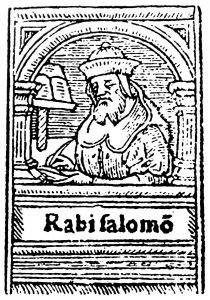
I visited the Society for Biblical Literature, which is right by the Emory alumni building, about a month ago. There, I met one of the employees and he told me about what they do. They are a huge conference, with a main annual conference in addition to regional conferences. I will be looking further into this as our research progresses.
Interestingly, around the same time Jerome translated his Psalterium Gallicanum, Jews translated the Psalms into Aramaic, a translation known as the Targum Psalms. Both translations were loose translations, and both arguably bent words in the direction of their respective interpretations. These translations, though they happened in the 4th Century, colored many of the commentaries of the middle ages.
I’ve been looking at some examples of Christian-Jewish controversies over the Psalms in the Middle Ages. Christians took every chance possible to interpret the Psalms as Messianic prophecies, especially Messianic prophecies referring to the person of first-century Jesus. At the same time, Andrew St. Victor and Hugh St. Victor worked hard not to mistranslate texts, so that Jewish commentators could not make arguments about Christian mistranslations (which were rife in the Latin Vulgate). In doing so, Andrew and Hugh often consulted with Jewish scholars.
I’m focusing especially on commentators based in France, because these commentators had the most influence on English translators and glossers. Jewish commentators include: Rashi (and his grandson, Rashbam), Joseph Kimhi (and his two sons, Moses and David Kimhi), and Jacob ben Reuben. Although I am taking my focus off Spain and the Muslim territories of the time, a number of rabbis in Southern France migrated there from Spain after being expelled. Thus, a good amount of Sephardic influence came into France.
Some Psalms I am focusing my reading on include: Psalms 1, 2, and 137.
Although many polemics were being passed back and forth between the two religions, the polemics on the Jewish end were generally used for internal purposes, to teach Jews and keep them from falling for Christian arguments for Jesus’ Messiahship.
At the same time, in the passing around of these polemics, the use of peshat (literal interpretation of the text) became a focus, and both Jewish and Christian sides eventually were forced to focus on the text and the language itself. This focus on the text (as opposed to interpretations loosely based on the text) ended up, in my opinion, leading (centuries later) to ideas like Sola Scriptura, which obviously led to the Reformation.
For this study, I’ve mostly been reading Susan Gillingham’s books, but also an essay on Medieval rabbis by Adele Berlin.


I am a bit worried about the tone and style of the writing. However, my hope is we will be able to work on that enough this week so that it doesn’t matter. I’ve harped on other blogs about tone and style, this is not so bad so let me ask a few questions about content.
In the third paragraph I am a little unclear of the motives and some of your meaning.
Andrew St. Victor and Hugh St. Victor were motivated by literal interpretations of the text, therefore they took care to not mistranslate text? I am not sure why they did this. I am not sure it entirely matters (from an academic sense) why they did this I just find it curious.
Also you use the phrase Latin Vulgate, I have no idea what this means. If the internet is to be believed, and it is not, this implies to me that the translations of psalms being done were retroactively having new testament text and phrases added in. Is that correct? Clearly I am misunderstanding something there.
That’s not to say that wouldn’t make sense to somebody who studies the translations of psalms (which should be your audience). Overall a good post, glad I had a chance to read it.
The whole issue of literal interpretations and linguistic faithfulness to the original texts is actually quite complicated, and took on a changing dynamic through the years. But I’ll do my best to give a brief explanation:
Jewish interpreters preferred literal-historical interpretations of the Psalms which focused less on long-term prophecies (e.g. prophecies that would be fulfilled centuries later) and more on short-term prophecies (prophecies that would be fulfilled in the prophet’s own lifetime). This exclusion of long-term prophetic interpretation also excluded more overt messianic interpretations of the Psalms. (To be sure, many Jewish interpreters still admitted to messianic meanings behind the Psalms, but they were generally muted or suppressed, especially in rabbis like Rashi who had more communication with Christian scholars; more importantly, they usually read the messianic references as references to the conquering messiah, as opposed to the suffering messiah, whom Christians believed was Jesus.)
Jewish interpreters accused Christians of not taking the Psalms literally enough. Christians made wider interpretations of the prophetic elements in the Psalms, framing them to support the messianic status of Jesus. They often played on symbolism, for example. At the same time, in doing so, they had to take certain passages more literally than the Jews did to point to the significance of symbols. This usually manifest itself in an intensely literal understanding of the Psalms that did not properly consider its poetic form, so Jewish interpreters also accused Christian exegetes for this. What’s more, the fact that Christians were using their own Latin translation, and the Jews were using their own Hebrew and Aramaic translations, made dialogue much more difficult. Some Christians eventually realized that the Jews had the fair upperhand on this, because the Psalms were written originally in Hebrew; these Christians took it upon themselves to understand the Hebrew of the Psalms, and in returning to the original language, inevitably took the original text’s meaning more seriously. (Their Latin translations were often heavily interpretive, and returning to the original helped them to understand the text outside of the lens of Christian interpretation.) Andrew St. Victor and Hugh St. Victor’s efforts eventually culminated in the scholarship of Nicholas of Lyra, who was renowned for his adept skill in Hebrew and respected by the Jews. (Lyra’s work eventually affected John Wycliffe’s translation and, later, Martin Luther’s translations of the Bible.)
Anyway, the Latin Vulgate was Jerome’s translation of the Bible into Latin. It was sort of the standard translation/text that the western church used, even though it was understood to be an inaccurate translation. This is partly because so very few Christians scholars knew Hebrew. In subtle (but significant enough ways), the Vulgate did indeed impose a Christian bias on its Old Testament texts, the Psalms included. Around the same time the Vulgate was translated, the Jewish Targumim were translated (Aramaic translation), and, similarly, retroactive anti-Jesus biases were added into the translation. These two translations worked as the main texts and backgrounds of the medieval interpreters, and also worked to make it much harder for productive Christian-Jewish dialogue to happen.
After reading your research post, I really like your research topic because it is of great importance to delve into how the Holy Bible was translated from Hebrew to Latin and to other languages and how does the translation impact Christians’ understanding of the gospel, particularly regarding to Messiah. I did notice many chapters of Psalms are referred as “Messianic psalm” in King James version of Bible (I had never read other versions of Bible so I can’t really speak about it), and I would be interested to know more about the differences of Jewish and Christian interpretation of psalms regarding Christ and how does that affect people to get to the truth of the Divine.
I was a bit confused at first about some of the jargon you included in your original post, but you explained it nicely in your follow up comment. I’ve grown up going to church my whole life and I had never stopped to consider how leaders of the Jewish community would have looked at the Old Testament after Christianity had begun to spread and claim it as part of its own faith. Do these historical accounts still color modern translations of the Torah and Old Testament today?
Well, they do in the sense that they lay the groundwork for translations by Wycliffe and Luther, who lay the groundwork for later translations. Some medieval arguments about phrases in the Bible get repeated today, so many of these interpretive conflicts are alive and well, so to speak.